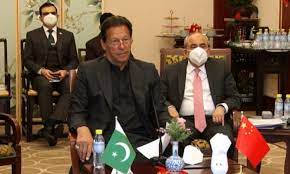Pakistan-China ‘Framework Agreement on Industrial Cooperation’ significant outcome PM Imran Khan’s visit to China: Key aide

Gwadar Pro
Islamabad: The ‘Framework Agreement on Industrial Cooperation’ between Pakistan and China is a significant outcome of Prime Minister Imran Khan’s recent visit to China, a key aide of the PM said.
Adviser to Prime Minister Imran Khan on Commerce and Investment Abdul Razak Dawood tweeted: “Signing of Framework Agreement on Industrial Cooperation’ between Pakistan and China is a breakthrough for China Pakistan Economic Corridor (CPEC) Phase II during the Prime Minister visit to China.”
He was optimistic that the agreement would enhance the process of Business-to-business (B2B) collaboration and matchmaking and pave the way for industrial relocation from China and export-led growth with numerous direct and indirect benefits to the economy. “I congratulate BOI (Board of Investment) for this landmark achievement,” Dawood maintained.
On February 4, Pakistan and China inked the Framework Agreement on Industrial Cooperation under the CPEC following Prime Minister Imran Khan’s arrival in Beijing. The PM was in China to attend the opening ceremony of the Winter Olympics and meet the Chinese leadership.
State Minister and Chairman Board of Investment Mohammad Azfar Ahsan and Chairman National Development and Reform Commission (NRDC) He Lifeng signed the accord.
The objective of the Joint Working Group (JWG) on Industrial Cooperation is to attract foreign direct investment (FDI), promote industrialisation and development of economic zones, and initiate, plan, execute, and monitor projects, both in public as well as the private sector.
The engagement with China under JWG is envisaged to increase labour productivity in Pakistan, enhance industrial competitiveness, increase exports, and sustain diversification in the exports basket.
During the 8th Joint Cooperation Committee (JCC) meeting of CPEC held in 2018, both sides had signed a Memorandum of Understanding that formed the basis for future engagements between the parties under the ambit of industrial cooperation.
As CPEC entered its second phase, which primarily revolves around the development and industrialisation of Special Economic Zones (SEZs), the need for a comprehensive framework agreement became imperative.
Similar agreements have also been signed for Early Harvest CPEC Projects on energy and infrastructure. With continuous efforts of BOI, both sides had reached the consensus to elevate the existing Memorendum of Understanding (MoU) into a Framework Agreement in 2020.
After extensive stakeholder consultations and with the approval of the Prime Minister, the BOI shared the draft framework with NDRC in November 2020, which has been formulated keeping in consideration the needs of CPEC Phase II.





